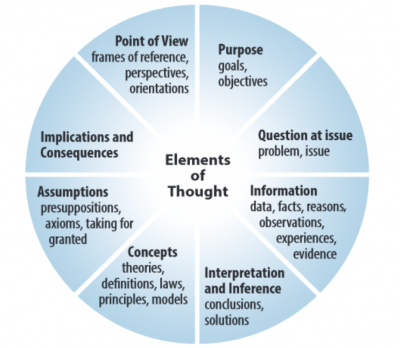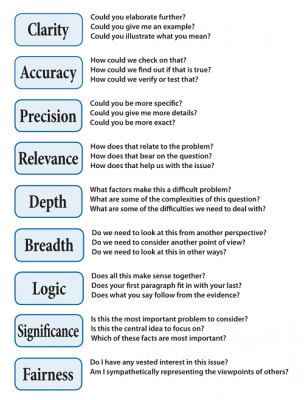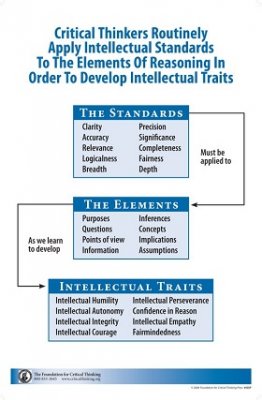In all of our work we advance a robust and comprehensive conception of critical thinking based in more than 40 years of research and development, unlike many consultants who focus on a narrow part of critical thinking – or who miss it entirely.
No matter what you do, you cannot escape our thinking. Whether you are working through a complex problem on the job, communicating with your significant other, trying to reason with your children, or even attempting to relax on your day off, your thinking is always driving you, determining how you see the world and your place within it. Whether you recognize it or not, whether it is yours or someone else's, thinking is the most significant determinant of the quality of human life. It is your thinking that determines the extent to which you can reason well through complex problems.
 The Elements of Reasoning
The Elements of Reasoning
One conceptual set we focus on in our consultations is the elements of reasoning, or parts of thinking. The elements or parts of reasoning are those essential dimensions of reasoning that are present whenever and wherever reasoning occurs —independent of whether we are reasoning well or poorly. For instance, we use assumptions in our reasoning; we pursue purposes; there are implications and consequences of our thinking, and so forth. Working together, the elements of reasoning shape reasoning and provide a general logic to the use of thought.
The elements of thought are presupposed in every profession, in every problem being solved, in every decision being made - in the workplace and throughout human thought and action.
The Intellectual Standards
 A second conceptual set we focus on is universal intellectual standards. One of the fundamentals of critical thinking is the ability to assess reasoning. To be skilled at assessment requires that we consistently take apart thinking and assess its components using standards of quality. We do this by routinely adhering, in all of our reasoning, to criteria based on clarity, accuracy, precision, relevance, depth, breadth, logicalness, significance, and sufficiency. Critical thinkers recognize that, whenever they are reasoning, they reason to some purpose (element of reasoning). Implicit goals are built into their thought processes. But their reasoning is improved when they are clear (intellectual standard) about that purpose or goal. Similarly, to reason well, they need to know that, consciously or unconsciously, they are using relevant (intellectual standard) information (element of reasoning) in their thinking. Furthermore, their reasoning improves if and when they make sure the information they are using is accurate (intellectual standard).
A second conceptual set we focus on is universal intellectual standards. One of the fundamentals of critical thinking is the ability to assess reasoning. To be skilled at assessment requires that we consistently take apart thinking and assess its components using standards of quality. We do this by routinely adhering, in all of our reasoning, to criteria based on clarity, accuracy, precision, relevance, depth, breadth, logicalness, significance, and sufficiency. Critical thinkers recognize that, whenever they are reasoning, they reason to some purpose (element of reasoning). Implicit goals are built into their thought processes. But their reasoning is improved when they are clear (intellectual standard) about that purpose or goal. Similarly, to reason well, they need to know that, consciously or unconsciously, they are using relevant (intellectual standard) information (element of reasoning) in their thinking. Furthermore, their reasoning improves if and when they make sure the information they are using is accurate (intellectual standard).
Intellectual standards are essential for reasoning well through any problem in the workplace and in any other part of life. Are you clear? Are you accurate? Is what you just said relevant to the question at the heart of this meeting? These are some of the questions, arising from intellectual standards, used by the best thinkers in all professions and businesses. By learning the tools of critical thinking, your employees are able to make these standards explicit in their minds, which enables them to actively employ these standards across the orgnization, in reasoning through all issues, and in all communications. We will help your team internalize these and other important intellectual standards.
 The Intellectual Traits
The Intellectual Traits
A third conceptual set in critical thinking is intellectual virtues or traits. Critical thinking does not entail merely intellectual skills. It is a way of orienting oneself in the world. It is a way of approaching problems that differs significantly from that which is typical in human life. People may have some critical thinking skills, and yet still be unable to enter viewpoints with which they disagree. They may have some critical thinking capabilities, and yet still be unable to analyze the beliefs that guide their behavior. They may have some critical thinking abilities, and yet be unable to distinguish between what they know and what they don’t know, to persevere through difficult problems and issues, and to think autonomously. Thus, in developing as a thinker and fostering critical thinking abilities in others, it is important to develop intellectual virtues – the virtues of intellectual humility, intellectual perseverance, intellectual courage, intellectual empathy, intellectual autonomy, intellectual integrity, fairmindedness, and confidence in reason.
Intellectual characteristics or virtues are essential to the critical thinker because without these, one's development is limited, and one's ability to function successfully in the world is diminished. We can teach your employees to cultivate their abilities to think within alternative viewpoints, to consider arguments openmindedly and in good faith, to leave their egocentric attitudes behind, to avoid group think, to have a clear understanding of the limits of their knowledge, and to create and contribute to an atmosphere of learning and improvement at your organization.

{"id":"4867","title":"","author":"","content":"<p><span style=\"font-size: large; font-family: arial, helvetica, sans-serif;\">In all of our work we advance a robust and comprehensive conception of critical thinking based in more than 40 years of research and development, unlike many consultants who focus on a narrow part of critical thinking – or who miss it entirely. </span><br /><br /><span style=\"font-size: large; font-family: arial, helvetica, sans-serif;\">No matter what you do, you cannot escape our thinking. Whether you are working through a complex problem on the job, communicating with your significant other, trying to reason with your children, or even attempting to relax on your day off, your thinking is always driving you, determining how you see the world and your place within it. Whether you recognize it or not, whether it is yours or someone else's, thinking is the most significant determinant of the quality of human life. It is your thinking that determines the extent to which you can reason well through complex problems.<br /><br /></span></p>\r\n<p><span style=\"font-size: large; font-family: arial, helvetica, sans-serif;\"><img style=\"float: left; margin-right: 10px; margin-top: 5px; margin-bottom: 5px;\" src=\"https://www.criticalthinking.org/data/courses/Elements_diagram.png\" alt=\"\" width=\"300\" height=\"261\" /></span><span style=\"color: #0000cc; font-family: arial, helvetica, sans-serif;\"><strong><span style=\"font-size: large;\"><span style=\"font-size: x-large; font-family: book antiqua, palatino;\">The Elements of Reasoning<br /></span></span></strong></span></p>\r\n<p><span style=\"font-size: large; font-family: arial, helvetica, sans-serif;\">One conceptual set we focus on in our consultations is the elements of reasoning, or parts of thinking. The elements or parts of reasoning are those essential dimensions of reasoning that are present whenever and wherever reasoning occurs —independent of whether we are reasoning well or poorly. For instance, we use assumptions in our reasoning; we pursue purposes; there are implications and consequences of our thinking, and so forth. Working together, the elements of reasoning shape reasoning and provide a general logic to the use of thought. </span></p>\r\n<p><span style=\"font-size: large; font-family: arial, helvetica, sans-serif;\">The elements of thought are presupposed in every profession, in every problem being solved, in every decision being made - in the workplace and throughout human thought and action. <br /><br /></span></p>\r\n<p><span style=\"color: #0000cc; font-family: arial, helvetica, sans-serif;\"><strong><span style=\"font-size: large;\"><span style=\"font-size: x-large; font-family: book antiqua, palatino;\">The Intellectual Standards<br /></span></span></strong></span></p>\r\n<p><span style=\"font-size: large; font-family: arial, helvetica, sans-serif;\"><img style=\"float: right; margin-left: 10px; margin-top: 5px; margin-bottom: 5px;\" src=\"https://www.criticalthinking.org/data/courses/Intellectual_Standards_1.png\" alt=\"\" width=\"280\" height=\"368\" />A second conceptual set we focus on is universal intellectual standards. One of the fundamentals of critical thinking is the ability to assess reasoning. To be skilled at assessment requires that we consistently take apart thinking and assess its components using standards of quality. We do this by routinely adhering, in all of our reasoning, to criteria based on clarity, accuracy, precision, relevance, depth, breadth, logicalness, significance, and sufficiency. Critical thinkers recognize that, whenever they are reasoning, they reason to some purpose (element of reasoning). Implicit goals are built into their thought processes. But their reasoning is improved when they are clear (intellectual standard) about that purpose or goal. Similarly, to reason well, they need to know that, consciously or unconsciously, they are using relevant (intellectual standard) information (element of reasoning) in their thinking. Furthermore, their reasoning improves if and when they make sure the information they are using is accurate (intellectual standard). </span></p>\r\n<p> </p>\r\n<p><span style=\"font-size: large; font-family: arial, helvetica, sans-serif;\">Intellectual standards are essential for reasoning well through any problem in the workplace and in any other part of life. Are you clear? Are you accurate? Is what you just said relevant to the question at the heart of this meeting? These are some of the questions, arising from intellectual standards, used by the best thinkers in all professions and businesses. By learning the tools of critical thinking, your employees are able to make these standards explicit in their minds, which enables them to actively employ these standards across the orgnization, in reasoning through all issues, and in all communications. We will help your team internalize these and other important intellectual standards.<br /><br /></span></p>\r\n<p><span style=\"font-size: large; font-family: arial, helvetica, sans-serif;\"><img style=\"float: left; margin-right: 10px; margin-top: 5px; margin-bottom: 5px;\" src=\"https://www.criticalthinking.org/data/courses/Elmnts_Stndrds_Traits_Diagram_2.jpg\" alt=\"\" width=\"245\" height=\"374\" /></span><span style=\"font-size: large; font-family: arial, helvetica, sans-serif;\"><span style=\"color: #0000cc; font-family: arial, helvetica, sans-serif;\"><strong><span style=\"font-size: large;\"><span style=\"font-size: x-large; font-family: book antiqua, palatino;\">The Intellectual Traits</span></span></strong></span></span></p>\r\n<p><span style=\"font-size: large; font-family: arial, helvetica, sans-serif;\">A third conceptual set in critical thinking is intellectual virtues or traits. Critical thinking does not entail merely intellectual skills. It is a way of orienting oneself in the world. It is a way of approaching problems that differs significantly from that which is typical in human life. People may have some critical thinking skills, and yet still be unable to enter viewpoints with which they disagree. They may have some critical thinking capabilities, and yet still be unable to analyze the beliefs that guide their behavior. They may have some critical thinking abilities, and yet be unable to distinguish between what they know and what they don’t know, to persevere through difficult problems and issues, and to think autonomously. Thus, in developing as a thinker and fostering critical thinking abilities in others, it is important to develop intellectual virtues – the virtues of intellectual humility, intellectual perseverance, intellectual courage, intellectual empathy, intellectual autonomy, intellectual integrity, </span><span style=\"font-size: large; font-family: arial, helvetica, sans-serif;\"><span style=\"font-size: large; font-family: arial, helvetica, sans-serif;\">fairmindedness, </span>and confidence in reason.</span></p>\r\n<p style=\"font-family: -webkit-standard;\"><span style=\"font-size: large; font-family: arial, helvetica, sans-serif;\">Intellectual characteristics or virtues are essential to the critical thinker because without these, one's development is limited, and one's ability to function successfully in the world is diminished. We can teach your employees to cultivate their abilities to think within alternative viewpoints, to consider arguments openmindedly and in good faith, to leave their egocentric attitudes behind, to avoid group think, to have a clear understanding of the limits of their knowledge, and to create and contribute to an atmosphere of learning and improvement at your organization.</span></p>\r\n<p><br /><span style=\"font-size: large; font-family: arial, helvetica, sans-serif;\"><br /> </span></p>\r\n<div>\r\n<div>\r\n<div class=\"gl-contains-divider\">\r\n<table class=\"editor-divider\" style=\"min-width: 100%;\" border=\"0\" cellspacing=\"0\" cellpadding=\"0\" width=\"100%\">\r\n<tbody>\r\n<tr>\r\n<td class=\"divider-container\" align=\"center\" valign=\"top\">\r\n<table class=\"galileo-ap-content-editor\" style=\"cursor: default; min-width: 100%;\" border=\"0\" cellspacing=\"0\" cellpadding=\"0\" width=\"100%\">\r\n<tbody>\r\n<tr>\r\n<td class=\"divider-base divider-solid\" style=\"padding: 9px 0px;\" width=\"100%\" align=\"center\" valign=\"top\">\r\n<table style=\"width: 100%; min-width: 100%; height: 1px;\" border=\"0\" cellspacing=\"0\" cellpadding=\"0\" align=\"center\">\r\n<tbody>\r\n<tr>\r\n<td style=\"padding-bottom: 2px; border-bottom-width: medium; border-bottom-style: none; height: 1px; line-height: 1px; background-color: #869198;\" height=\"1\" align=\"center\" bgcolor=\"#869198\"><br /></td>\r\n</tr>\r\n</tbody>\r\n</table>\r\n</td>\r\n</tr>\r\n</tbody>\r\n</table>\r\n</td>\r\n</tr>\r\n</tbody>\r\n</table>\r\n</div>\r\n<strong> <span style=\"font-size: 22.0pt; line-height: 107%; font-family: "Sylfaen",serif;\"> <span style=\"color: #a48506;\"> </span> </span> </strong> <strong> <span style=\"font-size: 22.0pt; line-height: 107%; font-family: "Sylfaen",serif;\"> <span style=\"color: #a48506;\"> </span> </span> </strong> <strong> <span style=\"font-size: 22.0pt; line-height: 107%; font-family: "Sylfaen",serif;\"> <span style=\"color: #a48506;\"> </span> </span> </strong> <strong> <span style=\"font-size: 22.0pt; line-height: 107%; font-family: "Sylfaen",serif;\"> <span style=\"color: #a48506;\"> </span> </span> </strong> <strong> <span style=\"font-size: 22.0pt; line-height: 107%; font-family: "Sylfaen",serif;\"> <span style=\"color: #a48506;\"> </span> </span> </strong> <strong> <span style=\"font-size: 22.0pt; line-height: 107%; font-family: "Sylfaen",serif;\"> <span style=\"color: #a48506;\"> </span> </span> </strong> <strong> <span style=\"font-size: 22.0pt; line-height: 107%; font-family: "Sylfaen",serif;\"> </span> </strong></div>\r\n</div>\r\n<p style=\"text-align: center;\"><a href=\"mailto: lisa@criticalthinking.org\" target=\"_blank\"><span style=\"font-size: large; font-family: arial, helvetica, sans-serif;\"><img style=\"vertical-align: middle;\" src=\"https://www.criticalthinking.org/data/courses/Email_Us_for_More_Details_button.jpg\" alt=\"\" width=\"325\" height=\"54\" /></span></a></p>\r\n<div>\r\n<div>\r\n<div class=\"gl-contains-divider\">\r\n<table class=\"editor-divider\" style=\"min-width: 100%;\" border=\"0\" cellspacing=\"0\" cellpadding=\"0\" width=\"100%\">\r\n<tbody>\r\n<tr>\r\n<td class=\"divider-container\" align=\"center\" valign=\"top\">\r\n<table class=\"galileo-ap-content-editor\" style=\"cursor: default; min-width: 100%;\" border=\"0\" cellspacing=\"0\" cellpadding=\"0\" width=\"100%\">\r\n<tbody>\r\n<tr>\r\n<td class=\"divider-base divider-solid\" style=\"padding: 9px 0px;\" width=\"100%\" align=\"center\" valign=\"top\">\r\n<table style=\"width: 100%; min-width: 100%; height: 1px;\" border=\"0\" cellspacing=\"0\" cellpadding=\"0\" align=\"center\">\r\n<tbody>\r\n<tr>\r\n<td style=\"padding-bottom: 2px; border-bottom-width: medium; border-bottom-style: none; height: 1px; line-height: 1px; background-color: #869198;\" height=\"1\" align=\"center\" bgcolor=\"#869198\"><br /></td>\r\n</tr>\r\n</tbody>\r\n</table>\r\n</td>\r\n</tr>\r\n</tbody>\r\n</table>\r\n</td>\r\n</tr>\r\n</tbody>\r\n</table>\r\n</div>\r\n<strong> <span style=\"font-size: 22.0pt; line-height: 107%; font-family: "Sylfaen",serif;\"> <span style=\"color: #a48506;\"> </span> </span> </strong> <strong> <span style=\"font-size: 22.0pt; line-height: 107%; font-family: "Sylfaen",serif;\"> <span style=\"color: #a48506;\"> </span> </span> </strong> <strong> <span style=\"font-size: 22.0pt; line-height: 107%; font-family: "Sylfaen",serif;\"> <span style=\"color: #a48506;\"> </span> </span> </strong> <strong> <span style=\"font-size: 22.0pt; line-height: 107%; font-family: "Sylfaen",serif;\"> <span style=\"color: #a48506;\"> </span> </span> </strong> <strong> <span style=\"font-size: 22.0pt; line-height: 107%; font-family: "Sylfaen",serif;\"> <span style=\"color: #a48506;\"> </span> </span> </strong> <strong> <span style=\"font-size: 22.0pt; line-height: 107%; font-family: "Sylfaen",serif;\"> <span style=\"color: #a48506;\"> </span> </span> </strong> <strong> <span style=\"font-size: 22.0pt; line-height: 107%; font-family: "Sylfaen",serif;\"> </span> </strong></div>\r\n</div>","public_access":"1","public_downloads":"0","sku":"","files":[],"images":[]}

 employees improve their effectiveness as they face issues and challenges within today's highly complex business world, and we help them learn to think through important implications in long-range planning for your organization.
employees improve their effectiveness as they face issues and challenges within today's highly complex business world, and we help them learn to think through important implications in long-range planning for your organization. 5. How to bring alive, and think realistically about, the concept of inclusion in the workplace.
5. How to bring alive, and think realistically about, the concept of inclusion in the workplace. The Elements of Reasoning
The Elements of Reasoning A second conceptual set we focus on is universal intellectual standards. One of the fundamentals of critical thinking is the ability to assess reasoning. To be skilled at assessment requires that we consistently take apart thinking and assess its components using standards of quality. We do this by routinely adhering, in all of our reasoning, to criteria based on clarity, accuracy, precision, relevance, depth, breadth, logicalness, significance, and sufficiency. Critical thinkers recognize that, whenever they are reasoning, they reason to some purpose (element of reasoning). Implicit goals are built into their thought processes. But their reasoning is improved when they are clear (intellectual standard) about that purpose or goal. Similarly, to reason well, they need to know that, consciously or unconsciously, they are using relevant (intellectual standard) information (element of reasoning) in their thinking. Furthermore, their reasoning improves if and when they make sure the information they are using is accurate (intellectual standard).
A second conceptual set we focus on is universal intellectual standards. One of the fundamentals of critical thinking is the ability to assess reasoning. To be skilled at assessment requires that we consistently take apart thinking and assess its components using standards of quality. We do this by routinely adhering, in all of our reasoning, to criteria based on clarity, accuracy, precision, relevance, depth, breadth, logicalness, significance, and sufficiency. Critical thinkers recognize that, whenever they are reasoning, they reason to some purpose (element of reasoning). Implicit goals are built into their thought processes. But their reasoning is improved when they are clear (intellectual standard) about that purpose or goal. Similarly, to reason well, they need to know that, consciously or unconsciously, they are using relevant (intellectual standard) information (element of reasoning) in their thinking. Furthermore, their reasoning improves if and when they make sure the information they are using is accurate (intellectual standard).  The Intellectual Traits
The Intellectual Traits